|
|
|
Sort Order |
|
|
|
Items / Page
|
|
|
|
|
|
|
| Srl | Item |
| 1 |
ID:
112377
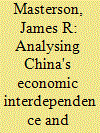

|
|
|
|
|
| Publication |
2012.
|
| Summary/Abstract |
This study examines the effects that economic interdependence has on political relations between China and its neighbours. Three economic liberal hypotheses are tested using data from the International Cooperation and Regional Conflicts dataset to measure dyadic political interaction along with economic data from the IMF and China Statistical Yearbooks and control variable data from Polity IV, COW CINC, among other sources. Though a significant amount of literature addresses the effects trade has on conflict at the systemic level, few studies address it at the dyadic level and even fewer test the pacification of trade on non-Western states. Examining economic, political, institutional, geographical, and political relations data from 1987 to 2001, this research tests the economic liberal hypothesis which posits that interdependence is associated with cooperative political relations between states. The findings show that trade interdependence is generally associated with political cooperation. However, the realist contention that relative power increases are associated with political conflict is also supported and analysed further.
|
|
|
|
|
|
|
|
|
|
|
|
|
|
|
|
| 2 |
ID:
120965
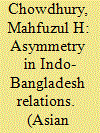

|
|
|
|
|
| Publication |
2013.
|
| Summary/Abstract |
The relation between the two close neighbors in the modern world is bound to be a relation of complex interdependence in normal situation for varied reasons. In South Asia, Bangladesh and India are not only geographically close neighbors, they also share common history, culture, and economic background. India also helped Bangladesh in its war of liberation from Pakistan in 1971, which prompted the liberation of Bangladesh from Pakistani occupation and hastened the emergence of Bangladesh as an independent state. Nethertheless, the relationship between these two neighbors is not symmetrically positive. While the reasons for asymmetry in their relations are manifold, a few of them may be worth mentioning here: history, the larger size of India compared to Bangladesh, the nature of political regimes and their leaders in the two countries, the government policies, geography/border, and the economic conditions in both the countries. This paper, while examining the recent issues that have created problems and the possible areas of cooperation and development in the relations between the two neighbors, suggests that a symmetrical relation of complex interdependence between India and Bangladesh will be beneficial for both the countries in many ways.
|
|
|
|
|
|
|
|
|
|
|
|
|
|
|
|
| 3 |
ID:
124143
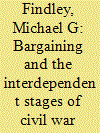

|
|
|
|
|
| Publication |
2013.
|
| Summary/Abstract |
This article examines civil war resolution as a process comprised of multiple interdependent stages. It engages directly the idea that peace emerges only as a process comprised of battle, negotiation, agreement, and implementation of an agreement. I hypothesize that events at earlier stages of the peace process have implications for later stages, but not always in the same ways. Drawing on bargaining models of war, I consider how two factors that might prevent successful bargaining-stalemates and the number of actors-can encourage cooperation early in a peace process but impede lasting cooperation at later stages. Using a nested dichotomies statistical approach to capture interdependence, I find support for the argument that stalemates and the number of actors have different effects depending on the stage of the peace process. The results substantiate the need in theoretical and policy work to consider peace as an interdependent, sequential process.
|
|
|
|
|
|
|
|
|
|
|
|
|
|
|
|
| 4 |
ID:
138875
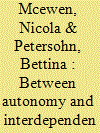

|
|
|
|
|
| Summary/Abstract |
Drawing on the distinction between self-rule and shared rule in multilevel states, this article argues that shared rule has been the neglected element of the UK devolution settlement. The ability of the devolved administrations to participate in, and influence, national decision making through shared rule mechanisms is very limited. The article argues that the lack of shared rule is especially problematic in light of the increasing complexity of the Scottish devolution settlement in the wake of the Scotland Act 2012 and the Smith commission report. Smith, in particular, seems set to increase both the power of the Scottish Parliament and its dependence on UK policy decisions in the areas of tax, welfare and the economy. Creating a more robust intergovernmental system which could manage these new interdependencies will be a significant challenge, and yet, without such a system, the new settlement will be difficult to sustain.
|
|
|
|
|
|
|
|
|
|
|
|
|
|
|
|
| 5 |
ID:
174962
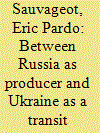

|
|
|
|
|
| Summary/Abstract |
Between 2014 and 2015, the EU started a new energy policy in order to address, among other issues, the problematic character of energy interdependence with Russia, and thus improve its energy security. The aim of this article is to determine how this policy considered interdependence with Russia in the light of diversification alternatives. Energy security is seen through short-term and long-term dimensions, which can be equated to the concepts of vulnerability and sensitivity interdependence. As the article shows, the alternative of LNG is limited by production and consumption patterns in both Europe and other world markets. It also shows that maintaining interdependence with Russia and reducing the role of transit countries such as Ukraine would yield benefits both in vulnerability and sensitivity interdependence. However, while the EU has strongly based its rhetoric on the promise of LNG, it has ignored alternatives that would maintain interdependence with Russia. Eventually, the EU's energy strategy has acknowledged the limitations of LNG, even though it has not changed its stance towards Russia. In that respect, it seems fair to conclude the EU has not rigorously analysed the transit dimension in its interdependence with Russia and the implications for its energy security.
|
|
|
|
|
|
|
|
|
|
|
|
|
|
|
|
| 6 |
ID:
165302
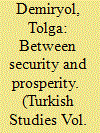

|
|
|
|
|
| Summary/Abstract |
Can natural resources facilitate regional cooperation? Recent discoveries of natural gas in the Eastern Mediterranean have led many to ask whether natural resources can bring peace and prosperity to the region. This article draws upon the contrast between liberal and realist perspectives on interdependence to explicate the extent to which shared economic interests can facilitate political cooperation in a conflict-ridden region. The analysis of Turkey’s Eastern Mediterranean strategy corroborates the proposition that when states prioritize security over prosperity, they will likely continue to escalate political tensions even if this jeopardizes economic gains from cooperation.
|
|
|
|
|
|
|
|
|
|
|
|
|
|
|
|
| 7 |
ID:
140319
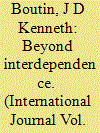

|
|
|
|
|
| Summary/Abstract |
China’s economic and politico-military development is placing considerable strain on the established framework of the trilateral relationship between itself, the United States, and Australia. Specifically, China’s rise is generating security concerns that are politicizing economic relations between the three states. A more guarded approach to economic collaboration will transform trilateralism, which up to now has been characterized by the scope allowed for the discrete pursuit of security and economic relations. This will force political authorities to carefully consider their policy priorities and further strain relations between the states, as well as supporting a more cautious approach to China on the part of the United States and Australia.
|
|
|
|
|
|
|
|
|
|
|
|
|
|
|
|
| 8 |
ID:
154342


|
|
|
|
|
| Summary/Abstract |
In the past half-decade, the role of the Gulf in the international political economy has changed dramatically. The region’s position as a supplier of world hydrocarbons has slipped, even as local consumption of oil and gas continues to expand. Gulf investments have shifted from the industrialized countries to the Middle East and North Africa. Saudi Arabia no longer exercises disproportionate influence in the Group of 20. Finally, relations with the People’s Republic of China and India have become truly interdependent, which gives the Gulf the capacity to exercise leverage over these two rising powers, despite its diminished position in global affairs.
|
|
|
|
|
|
|
|
|
|
|
|
|
|
|
|
| 9 |
ID:
083737
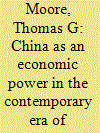

|
|
|
|
|
| Publication |
2008.
|
| Summary/Abstract |
China's rising profile in world economic affairs is beyond dispute. This article explores several ways to think about China's experience as a latecomer, offering a preliminary assessment of its development trajectory and the evolving nature of its foreign economic relations. In particular, the analysis rejects the view that China is emerging as the hub of a regional economic order in East Asia that is increasingly cohesive and independent vis-à-vis other regions of the world. Alternatively, the article highlights the promise of research that focuses on the role of Chinese economic activity within global commodity chains and how this particular form of cross-border integration affects interdependence among nation-states at multi-continental distances
|
|
|
|
|
|
|
|
|
|
|
|
|
|
|
|
| 10 |
ID:
145693
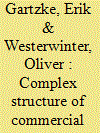

|
|
|
|
|
| Summary/Abstract |
Researchers continue to debate the impact of trade on interstate conflict. While many view trade as pacifying, others argue that dependencies increase friction and the risk of war. We provide a theory that explains how cross-border economic ties alternately enhance or impede international cooperation. Three main factors account for the heterogeneous effects of trade on conflict: interdependence, asymmetry, and multipolarity. Interdependence can act as a substitute for, or as a deterrent to, militarized violence. In the former case, interdependence actually increases more modest non-militarized conflict, while also discouraging militarized disputes. Asymmetry diminishes the conflict-inhibiting effect of trade ties, as dependency cannot simultaneously be used to coerce and to inform. Multilateral trade networks alternately moderate or enhance the bilateral effects of interdependence and asymmetry on interstate peace. Our theory and evidence reveal complex, cross-cutting consequences of economic interdependence on conflict behavior and also demonstrate effects well beyond the dyad, suggesting the need to include extradyadic ties in future theoretical and empirical research studying the commercial peace.
|
|
|
|
|
|
|
|
|
|
|
|
|
|
|
|
| 11 |
ID:
117055
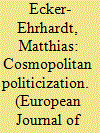

|
|
|
|
|
| Publication |
2012.
|
| Summary/Abstract |
Much of what can be subsumed under the label 'political cosmopolitanism' calls for the empowerment of international institutions because of increased global interdependencies. Surprisingly, however, few scholars have asked whether ordinary citizens share this way of thinking. Do people believe that international institutions are desirable because of their superior capacity to solve transnational problems? To address this question, falsifiable hypotheses about the quality of and scope conditions for a minimally defined 'public political cosmopolitanism' are derived from the literature and tested using the results of a representative survey of German citizens. I show that there is significant support for what I call the 'interdependence model' of cosmopolitan politicization: German citizens' perception of transnational interdependencies (in terms of functional sensitivity as well as moral commitments) fosters beliefs in the capacity of international institutions to solve problems. Remarkably, this relationship is moderated by citizens' sense of their own vulnerability, that is, their beliefs that the national government is incapable of solving such problems. The interdependence model has significant explanatory power, spanning different levels of education, and thus disproves claims that cognitive mobilization is a crucial scope condition for cosmopolitan politicization.
|
|
|
|
|
|
|
|
|
|
|
|
|
|
|
|
| 12 |
ID:
191010


|
|
|
|
|
| Summary/Abstract |
The race to rapidly decarbonise and digitalise the global economy by 2030 to avoid temperatures rising above 1.5C has been subsumed by geopolitics that remains anchored in realist power struggles, now revolving around Sino-American hyper-competition. The Russian invasion of Ukraine further undermined interdependence and prompted unprecedented levels of economic statecraft. Access to indispensable minerals for a net zero future has thus become more securitised. The European Union (EU) has pushed back against bipolar geopolitics by utilising its normative, economic and regulatory power and strong networks of global institutional relations to maintain a competitive but working relationship with the People’s Republic of China (PRC). Such an approach may help broker broader global institutional collaboration to ensure that decarbonisation is for all, not just for the few.
|
|
|
|
|
|
|
|
|
|
|
|
|
|
|
|
| 13 |
ID:
194006


|
|
|
|
|
| Summary/Abstract |
Though it is a core function of a sovereign state, governments do not navigate defense policy free from outside influences and constraints. The provision of external security requires armed forces to be adequately equipped but the distribution of material resources - defense-industrial capacity – for such equipment is not even but rather concentrated in the international system. How do alliance politics and defense-industrial policy connect? Our contribution highlights the material resources for military alliance effectiveness and emphasizes a strategic view of the relationship between these material factors and alliance burden-sharing. The sudden surge in demand for materiel resulting from Russia’s invasion of Ukraine revealed the defense-industrial fault lines within the transatlantic alliance. We outline existing dependencies and interdependencies, identify trade-offs and connections between industrial policy and defense spending, and formulate policy recommendations based on our findings. Taking a political economy of security perspective, these recommendations are aimed at a better understanding of how industrial politics and alliance stability are intertwined. They suggest pathways to a new and more stable transatlantic defense-industrial bargain in an era of increased great power conflict.
|
|
|
|
|
|
|
|
|
|
|
|
|
|
|
|
| 14 |
ID:
116810
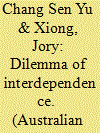

|
|
|
|
|
| Publication |
2012.
|
| Summary/Abstract |
The relations between China and Australia are akin to close interdependence; however, they are not symmetrical and are sometimes even contradictory. Although China is the number-one trade partner of Australia, it is the most uncertain factor in security concerns for Australia. The Sino-Australian relationship is essentially a process of constant inter-adjustment by China, as an Oriental great power with a socialistic political system, and Australia, which is a leading middle power in the Asia-Pacific region and tends to keep its policies at a status quo. The phenomenon of both cooperation and competition in Sino-Australian relations reflects a universal law in the international political power transfer process.
|
|
|
|
|
|
|
|
|
|
|
|
|
|
|
|
| 15 |
ID:
087435
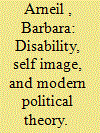

|
|
|
|
|
| Publication |
2009.
|
| Summary/Abstract |
Charles Taylor argues that recognition begins with the politics of "self-image," as groups represented in the past by others in ways harmful to their own identity replace negative historical self-images with positive ones of their own making. Given the centrality of "self image" to his politics of recognition, it is striking that Taylor, himself, represents disabled people in language that is both limiting and depreciating. The author argues such negative self-images are not unique to Taylor but endemic to modern political thought from John Locke to John Rawls, as the disabled ("irrational" and/or mentally disabled/ill people) are constituted in direct opposition to the rational person and/or citizen. Using contemporary social theories of disability, as articulated by disabled scholars and advocates, the author concludes that such negative self-images (and the binary of autonomy/justice and dependency/charity underpinning them) must be purged from political theory and replaced with an alternative theory of personhood/citizenship rooted in the image of interdependency.
|
|
|
|
|
|
|
|
|
|
|
|
|
|
|
|
| 16 |
ID:
167289


|
|
|
|
|
| Summary/Abstract |
The use of repressive strategies by authoritarian regimes received a great deal of attention in the literature, but most explanations treat repression as the product of domestic events and factors. However, the similarity in repressive actions during the Arab Spring or the intense collaboration in dissident disappearances between the military regimes of Latin America indicate a transnational dimension of state repression and authoritarian interdependence that has gone largely understudied. The article develops a theory of diffusion of repression between autocracies between institutionally and experientially similar autocracies. It proposes that the high costs of repression and its uncertain effect on dissent determines autocracies to adjust their levels of repression based on information and knowledge obtained from their peers. Autocracies’ own experience with repression can offer suboptimal and incomplete information. Repression techniques and methods from other autocracies augment the decisionmaking regarding optimal levels of repression for political survival. Then, autocracies adjust their levels of repression based on observed levels of repression in their institutional and experiential peers. The results indicate that authoritarian regimes emulate and learn from regimes with which they share similar institutions. Surprisingly, regimes with similar dissent experience do not emulate and learn from each other. The results also indicate that regional conflict does not affect autocracies’ levels of repression.
|
|
|
|
|
|
|
|
|
|
|
|
|
|
|
|
| 17 |
ID:
105756
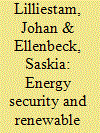

|
|
|
|
|
| Publication |
2011.
|
| Summary/Abstract |
Solar power imports to Europe from the deserts of North Africa, as foreseen in the Desertec concept, is one possible way to help decarbonising the European power sector by 2050. However, this approach raises questions of threats to European energy security in such an import scenario, particularly in the light of increasing import dependency and Russia's use of the "energy weapon" in recent years. In this paper we investigate the threat of North African countries using the Desertec electricity exports as an "energy weapon". We develop and use a new model to assess the interdependence - the bargaining power symmetry, operationalised as costs - of a disruption in a future renewable electricity trade between North Africa and Europe. If Europe maintains current capacity buffers, some demand-response capability and does not import much more than what is described in the Desertec scenario, it is susceptible to extortion and political pressure only if all five exporter countries unite in using the energy weapon. Europe is not vulnerable to extortion by an export cut from only one country, as the European capacity buffers are sufficient to restore the power supply: no single exporter country would have sustained bargaining power over Europe.
|
|
|
|
|
|
|
|
|
|
|
|
|
|
|
|
| 18 |
ID:
100390
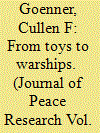

|
|
|
|
|
| Publication |
2010.
|
| Summary/Abstract |
The United States recently proposed to sell Saudi Arabia advanced weaponry worth 20 billion dollars over the next 10 years. The volume of trade, while significant, is second in the news headline that the United States would provide Saudi Arabia with precision-guided bombs, upgrades to its fighters, and new naval vessels. Trade of strategic commodities, such as armaments, suggests a strong interdependence between countries, which may influence international relations differently than the same volume of toys traded between nations. The author posits the volume and pattern of commodities that countries trade with each other are both relevant to interstate conflict. Commodities are heterogeneous and thus vary in terms of their strategic importance, substitutability, and ease of expropriation. This heterogeneity, along with the volume of trade, influences the opportunity cost of lost trade caused by conflict. This article empirically examines whether the pattern of trade is relevant to conflict for the period 1962-2000. The results from both single and simultaneous equations models indicate that increasing the share of bilateral trade in energy, non-ferrous metals, and electronics increases conflict, whereas for chemicals and arms it reduces conflict. Differences in these strategic commodities' elasticity of import demand and export supply, along with their ease of expropriation, contribute to the heterogeneous effects.
|
|
|
|
|
|
|
|
|
|
|
|
|
|
|
|
| 19 |
ID:
099610
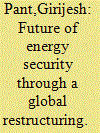

|
|
|
|
|
| Publication |
2010.
|
| Summary/Abstract |
The base and superstructure of the present energy regime are becoming unsustainable. With billions joining the energy market, supplies have to expand exponentially. The expansion of energy supplies from new sources becomes the necessary condition for global energy security. The scale of expansion required to construct a new global energy mix can only be accomplished through a global approach. It is a global question because the concerned stakeholders are located in different regions consisting of different globalising economies. Increasing integration and interdependence among the energy suppliers and consumers, and the location of the energy industry in the globalising market, has necessitated the redefinition of energy security both at the conceptual and policy level. The future of energy security has to be defined in terms of global energy systems and regime. A global restructuring of energy system would inevitably assume global engagement, global partnership and global norms and institutions.
|
|
|
|
|
|
|
|
|
|
|
|
|
|
|
|
| 20 |
ID:
159364


|
|
|
|
|
| Summary/Abstract |
Since the end of the civil war in 1990, the Lebanese second Republic has experienced a dual security governance in the southern borderland region. Up to the Syrian military withdrawal in 2005, the territorial and functional ‘areas of limited statehood’ between the State and Hizbullah worked as a cooperation. After the Syrian withdrawal, various forms of cooperation appeared, raising the theoretical interest for the ‘mediated state’ framework. It is conceptualizing the cooperation between the state and the non-state actor as an interdependency – with case study ranging from the marking of the Blue Line to the struggle against the jihadists groups.
|
|
|
|
|
|
|
|
|
|
|
|
|
|
|
|
|
|
|
|
|